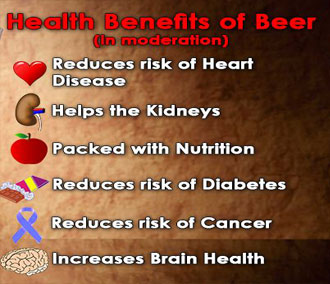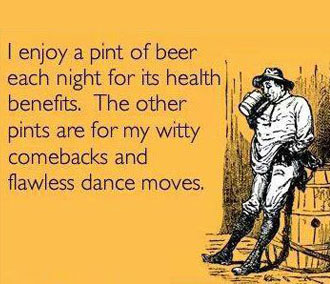 You might already be aware of the health benefits of moderate alcohol consumption, but did you know that your favorite pint (around 470ml) may actually have some amazing health benefits you were probably not aware of?
You might already be aware of the health benefits of moderate alcohol consumption, but did you know that your favorite pint (around 470ml) may actually have some amazing health benefits you were probably not aware of?
This could be really good news if you are a beer drinker, but before you get too excited about that next drink and order a keg, remember that alcohol is a double-edged sword - with moderation and responsibility being the key to a healthy balance.
KEEP YOUR TICKER TICKING
Wine usually gets all the credit as the booze that helps cut back your cardiovascular disease risk, but beer may be just as heart-healthy of a beverage. Italian researchers found that moderate beer drinkers had a 42 percent lower risk of heart disease compared to non-drinkers. For maximum protection, keep your consumption to one pint—at around 5 percent alcohol by volume—a day, the researchers say.
“The key therefore to enjoying beer’s health benefits, is moderation. And what is moderation? It means no more than two to three 340ml cans of beer per day for men and no more than one to two for women,” she says.
For those who can practice moderation, these are some of the health benefits you may enjoy.
1. Increased intake of protein, B vitamins and antioxidants
From a nutritional standpoint, beer contains more protein and B vitamins than wine.
According to a 2001 antioxidant food review in Nutrition Reviews beer contains around double the amount of antioxidants as white wine but half of that of red wine. The specific antioxidants in beer are different because the barley and hops used in the production of beer contain flavonoids different from those in the grapes used in the production of wine.
2. Healthier bowel function
Beer is a good source of soluble fibre, which is derived from the cell walls of malted barley. One litre of beer can contain up to 6 grams of soluble fibre, which is a third of the recommended daily intake.
Soluble fibre aids in healthy bowel function, and also helps mop up excess cholesterol and sugar in the digestive system. A 230ml can of beer will contain about 5.7g of total carbohydrates. Of those, just 2.5g will be residual sugar and the rest dietary fibre. In comparison, a standard (175 ml) glass of wine contains 5.9g of carbohydrate but 5.6g of that will be free sugars and wine has no dietary fibre.
3. Reduced Risk of Heart Disease
The topic of heart disease and alcohol is controversial because it can be both a protective and a causal factor. It really depends on the mechanism of action and what the individual is going to benefit from most- either moderation or abstinence. It has long been known that moderate alcohol consumption reduces the risk of heart disease, when compared to heavy drinkers and even teetotalers.
The main mechanisms by which beer lowers heart disease risk is by increasing our levels of HDL, or good cholesterol and by preventing clotting (by lowering clotting factors like fibrinogen) and therefore thinning the blood. However, people with high triglycerides or hypertension are still encouraged to exercise caution when drinking alcohol, which exacerbates these two risk factors for coronary artery disease.
4. Stronger Bones
Beer is high in the mineral silicon, which can act as a powerful bone strengthener. In fact, beer is the only natural source of silica for post –menopausal women. According to a 2009 study in the American Journal of Clinical Nutrition, moderate beer drinkers had a higher bone mineral density when compared to people who drank more or fewer beers. Pale Ale tends to have the highest silica content of all the beer types. “Don’t use beer as your anti-osteoporosis plan. High intakes of calcium, lots of vegetables and weight bearing exercise are key to a healthy bone density.
5. Reduced Cancer Risk
Heterocyclic amines (HCAs) are carcinogenic compounds produced when meat is cooked at high temperatures. Marinating meat or chicken in beer or wine has been shown to reduce the formation of carcinogenic HCA’s by up to 88% with beer to be the more effective HCA reducing marinade according to a 2009 study in the Journal of Agricultural and Food Chemistry. At the same time, high alcohol intake has been linked to certain cancers, like those of the mouth and digestive system as well as breast cancers.
6. Reduced Risk of Diabetes
“Contrary to what you might think, alcohol actually lowers blood sugar rather than raising it. A large 2011 Harvard study of about 38,000 middle-aged men found that when those who drank moderately (around 2 drinks per day), dropped their diabetes risk by 25%. Beer, however, has a high glycemic index of 100, which means it can cause spikes and then drops in blood sugar levels. In moderation, however, the effect is not severe because beer has a moderate glycemic load of 6, due to its relatively low carbohydrate content.




